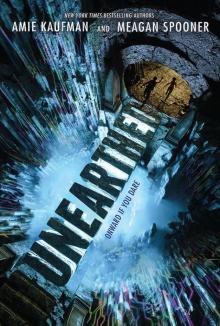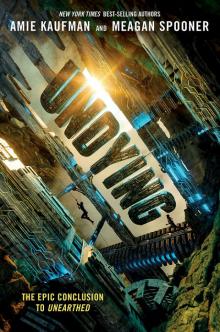- Home
- Amie Kaufman
Their Fractured Light: A Starbound Novel
Their Fractured Light: A Starbound Novel Read online
Copyright © 2015 by Amie Kaufman and Meagan Spooner
Cover design by Whitney Manger
Cover photograph © 2015 Tom Corbett
CGI art © 2015 Bose Collins
Designed by Whitney Manger and Marci Senders
All rights reserved. Published by Hyperion, an imprint of Disney Book Group. No part of this book may be reproduced or transmitted in any form or by any means, electronic or mechanical, including photocopying, recording, or by any information storage and retrieval system, without written permission from the publisher. For information address Hyperion, 125 West End Avenue, New York, New York 10023.
ISBN 978-1-4231-8780-6
Visit www.hyperionteens.com
Contents
Title Page
Copyright
Dedication
One: Sofia
Two: Gideon
Three: Sofia
Four: Gideon
Five: Sofia
Six: Gideon
Seven: Sofia
Eight: Gideon
Nine: Sofia
Ten: Gideon
Eleven: Sofia
Twelve: Gideon
Thirteen: Sofia
Fourteen: Gideon
Fifteen: Sofia
Sixteen: Gideon
Seventeen: Sofia
Eighteen: Gideon
Nineteen: Sofia
Twenty: Gideon
Twenty-One: Sofia
Twenty-Two: Gideon
Twenty-Three: Sofia
Twenty-Four: Gideon
Twenty-Five: Sofia
Twenty-Six: Gideon
Twenty-Seven: Sofia
Twenty-Eight: Gideon
Twenty-Nine: Sofia
Thirty: Gideon
Thirty-One: Sofia
Thirty-Two: Gideon
Thirty-Three: Sofia
Thirty-Four: Gideon
Thirty-Five: Sofia
Thirty-Six: Gideon
Thirty-Seven: Sofia
Thirty-Eight: Lilac
Thirty-Nine: Gideon
Forty: Sofia
Acknowledgments
About the Authors
For Josie Spooner and Flic Kaufman, our sisters and very first partners in crime, whose imaginations helped set us on the path of storytelling all those years ago.
A ripple.
The stillness quakes and splits and where once there was nothing, only us, there is something new. Bright and hard and cold and skimming the surface of the stillness, the new thing is there only an instant before it is gone again.
But we gather. And we watch. And we wait, because there has never been anything new before, and we want to see it again.
THE DAPPLED SUNLIGHT THROUGH THE grass is beautiful, though I know it’s not real. The light casts no warmth on my skin; I’ll suffer no burns, no freckles. The grass doesn’t bend under my feet, though they sink through it to the marble floor beneath the holographic images. A year ago I would have gasped aloud at the sight of sun and blue skies, even holographic ones, but today I find they just make me miss home. What I’d give, now, to lift my head and see bruise-colored clouds sweeping down to meet the marsh, a vastness to the horizon that no holographic lobby in an office building could hope to replicate.
The holosuite is full of people, and while many of them seem to be employees here at LaRoux Industries Headquarters, others are harder to pinpoint. Some carry old-timey briefcases in a nod to ancient vintage fashion from 1920s Earth, the current fad among the upper crust. Others sport only their palm pads; the affectation of carrying purses and cases is absurd, when everything that would’ve gone inside—money, documents, telephones, identification cards—was digitalized hundreds of years ago.
But the trend does make it easy to carry around everything I need without anyone asking questions. Only a couple years ago I would’ve been stuck in pseudo-Victorian garb if I wanted to be fashionable, hiding the tools of my trade under an unwieldy skirt. As it is, my tea dress is light, easy to run in if necessary, and—most importantly—an airy, innocent ivory lace that makes me look even younger than seventeen. I tuck my handbag close to my body, taking a deep breath and scanning the throngs of people.
There’s a tension in the air that makes my pulse quicken. It’s subtle—those hiding here in plain sight are doing so flawlessly. Almost. But I grew up on Avon, and I know how to read a crowd. I know how quickly a protest turns into a riot—I know how quickly a peaceful town becomes a battlefield.
I don’t know if the vast security network at LaRoux Industries is aware of the underground protests scheduled to occur today. I only know about them because I was told by one of my contacts in Corinth Against Tyranny—a ridiculous name, but it’s a romantic notion to fight the good fight against the oppressors. Looking around the holosuite outfitted with lemonade dispensers and sodas whizzing here and there on hover trays, the air littered with conversation and laughter, I can’t help but think that these people don’t know what oppression is. I tear my eyes away from a couple indulgently watching a child of five or six chasing a pair of holographic birds through the air. There’s a reason LaRoux Industries tops the “best places to work in the galaxy” list every year, and if I’d been the one organizing today’s protest, I certainly wouldn’t have chosen the new twentieth-floor holosuite as the setting.
Free for employees, and available to the public for only a small charge, the holosuite is part of LaRoux’s new outreach program. “See how generous I am?” he’s saying. “I’m dedicating whole floors of my headquarters to providing safe, fun places for you and your children.” His campaign to make the galaxy love him, to make people forget the accusations leveled at him in the Avon Broadcast, is enough to turn my stomach—not least because it’s working.
The people here do seem happy. No one here cares that people were dying on Avon before Flynn Cormac’s now-infamous speech a year ago. Nobody cares that Roderick LaRoux is a monster—mostly because only small pockets of people here and there actually believed a word of Flynn’s broadcast. These people are here because it looks good on their media pages to say they were at a protest. Some of them are probably hoping to get arrested so they can later post their mug shots on the hypernet.
But it does make a great distraction for what I’m here to do.
I have only a name for the contact I’m meeting—Sanjana Rao—and though it speaks of family roots in old India, it’s just as likely she could be blond-haired and blue-eyed, given the way all the races and bloodlines from Earth have been jumbled up over the centuries. She’ll ping my palm pad when she’s here, but I can’t help but look for her anyway.
I find my gaze creeping toward the elevator doors, cleverly concealed in this park simulation as the entrance to a carousel. This is the closest I’ve been to LaRoux himself after a year of chasing him, and all I want to do is break into their secure elevators and climb to the penthouse floor. A year of burned identities and isolation; of painful tattoo removal surgeries that still haven’t completely erased my genetag; of keeping all traces of myself, all remnants of my old life, with me at all times in case today, this moment, is the one where I’m going to have to pack up and run again.
But LaRoux himself is nearly impossible to reach. If he wasn’t, someone would’ve already killed him years ago—for all that the galaxy at large loves him, enough of the people he’s trampled on his way to power see him for what he is. No, a head-on approach will never reach him. Taking out LaRoux requires subtlety.
I glance at my inner arm, a habit I still haven’t broken. Someone clever could guess at what the look means—no one born on Corinth or any of the older planets is given a gen
etag at birth—and yet I do it anyway. The faint remnant of my genetag tattoo is safely hidden, though I have to take care not to rub against my dress and risk transferring a telltale smear of concealer to the fabric. I want to grab for my palm pad, to check it to see if I could have missed Dr. Rao’s ping, but standing here repeatedly checking my messages would be a clear sign of nervousness, if anyone was watching me.
It’s only when I lift my head that I realize I do have an audience. And that it isn’t my contact.
A young man’s seated on the floor, his back against a tree—a tree that isn’t really there, of course. His back is against a marble pillar, but the holographic skin of the room makes it look like he’s relaxing in a park. Except, of course, that he’s got a lapscreen and it’s plugged into the side of the tree. There’s a wireless power field here, so I know he’s not charging his screen. It’s a data port, which is odd enough, given that any info accessible in a public place like this would be on the hypernet. But that’s not what makes me stop, makes my heart seize. It’s that he’s wearing the green and gray of LaRoux Industries, and that there’s a lambda embroidered over his breast pocket. He works here—and he’s watching me.
My mouth goes dry, and I force myself not to jerk my gaze away. Instead I tip my head as if puzzled, trying my absolute best to seem intrigued, even coy.
A grin flashes across his features when I catch him watching me. He makes no attempt to pretend he wasn’t, just flicks his fingers to his brow and then away as though tipping an imaginary hat. He doesn’t look like a typical office worker, with longer hair of a shade hovering somewhere between sandy blond and brown and a lazy, almost insolent cast to his body as he leans against the pillar.
I take a breath to settle, hiding any trace of fear that he knows I don’t belong here. Instead I smile back, settling easily into the façade of shy and sweet; to my relief, his grin widens. Just flirting, then.
He winks, then presses a single button on his lapscreen. A holographic bird with brilliant red plumage swoops across my path and then freezes in midair. Abruptly, all the background sounds halt: birdsong and rustling leaves and even some of the laughter and conversation—all gone. Then, without warning, the entire holopark vanishes, leaving us in a vast white room.
The only thing in the room, besides the people, the projectors, and the pillars like the one the boy’s leaning on, is a vast metal ring twice my height at its center. It stands upright, made of some strange alloy that shines dully in the bright white light, and is connected to the floor at its base by a pedestal covered with dials and instruments. LaRoux’s particular holographic technologies are proprietary, but this looks like no projector I’ve ever seen—and while the other projectors are flickering and whirring and trying to overcome whatever glitch made them stop working, the metal ring is still and silent.
A murmur of confusion sweeps through the throngs of people, as groups abandon their conversations in favor of looking around, as though the room might hold some explanation. Its other features stand out now that there’s no masking hologram in place—the drink dispensers are bare and stark, the various projectors and speakers littering the low ceiling like misshapen stars.
Whatever’s going on, it wasn’t planned by the protesters. Everyone, employees and public alike, is milling around in confusion. If it were planned, the protesters would be using the glitch to launch their protest, but instead even the security guards at the edges of the room look unnerved. I let my eyes widen, using a group of interns as cover to move as quietly and purposelessly as I can toward the emergency stairwell. If I’m caught, the worst they’ll assume of me is that I was here to protest. But I’d rather not get in their books at all.
Before I can make it to the fire exit, a flicker of color grabs my eye and I turn in time to see the boy with the lapscreen pull a chip the size of his fingernail out of his screen and stow it in his pocket. Glancing up at the ceiling, he gets up and takes two slow, easy steps to the side, neatly placing himself in the security camera’s blind spot.
Then he’s shrugging out of his LaRoux Industries uniform until he’s just wearing an undershirt, tattooed arms bare for half an instant. He turns the garment inside out, revealing a garishly striped shirt matching the high-fashion trend of the moment—and just like that, he melts into the crowd. No longer an employee of LaRoux Industries.
And far, far too clever to be one of the protesters now milling around, confused and annoyed that they never got their chance to get on the news.
“Ladies and gentlemen, your attention please.” A voice, smooth as cream and amplified over the noise of the crowd, emerges from the speakers. “We’ve detected a security breach and traced its source to this room. Please remain calm, and cooperate with all security officers to the fullest extent, and we will have this resolved as soon as possible.”
The security guards, operating on some order given via the implants in their ears, have started funneling people off one by one, presumably to interrogate them individually. One of the guards is still standing by the door, blocking the exit to the stairwell—blocking my escape route. The concealer on my arm might fool a quick glance from someone at the front desk, but now I have no chance of passing myself off as a protester—a security breach will have them on high alert. The first thing those guards will do when they grab me is check for a genetag tattoo, certain that border planet insurgents are the most likely culprits. I close my eyes, calling up the floor plans I’ve been studying for a week and a half. They’ll have shut down access to the elevators on this floor, but there’s another fire exit and another set of stairs through one of the hallways leading off from here. I scan the crowds until I find that exit, and the guard ushering people in that direction.
What I need is a diversion.
My eyes fall on a loud, red-and-gold striped shirt. Whoever the boy is, he’s not from LaRoux Industries, and he’s not supposed to be here either. And while I can’t be sure that keystroke of his is what took down the holo-projectors, I do know that if we get grabbed together, he’s the one who’s going to look far more suspicious than I am once they realize he’s got an LRI uniform sewn into his clothes. I mutter a curse under my breath and rush forward to the guard’s side.
Sorry, Handsome. I’m pretty sure you want to be center of attention just about as much as I do. But if there’s one person here in more trouble than me, it’s the guy with the fake LaRoux Industries uniform on under his shirt.
“That boy there,” I say, keeping my voice low, forcing my eyes wide. “I think he needs help.” With any luck, they’ll go check on him and I can slip out once they discover he’s not supposed to be here.
The guard’s gaze swings around immediately to rest on the boy in the striped shirt, who’s watching us with a slight edge to his nonchalant air. His smile dies away entirely as the guard takes two steps toward him, and I ease my weight back, the first step toward the door the man was guarding. Slowly, slowly, don’t draw attention.
As if my thought was spoken aloud, the guard reaches out to wrap a hand around my arm. “Show me,” he orders. I freeze, and, to make matters worse, he lifts his hand to signal to one of the other heavies over in our direction. Now I’ve got two guards watching me, and the door’s about to be blocked again. Damn it. If they make me go with them, they may well assume I’m with him when they discover his fake LRI shirt. Now I have to get us both out of here.
Good work, Sofia.
My mind throws up a flurry of possibilities, and in a split second I sort through them, discarding the impossible, left with only one way to divert both of them to the boy.
“Please hurry,” I gasp, focusing the muscles in my face until my eyes start to water with tears. “He’s my fiancé—he has a condition, stress makes it worse.” In the confusion, with so many people to process, I can only hope the guard doesn’t want to ask too many questions.
The guard blinks at me and, when I turn to indicate the boy in the striped shirt, follows my gesture. The boy stares back, openly
wary now, eyes flicking from the guard to my face. Please, I think. Just don’t say anything until I can get past them.
“You were both fine a minute ago.” He exchanges glances with his colleague, who’s standing by me now. “I’m sure it can wait.” His voice is even, giving not an inch, but his hand strays, shifting from the weapon at his waist to tug at his sleeve.
I double my efforts, forcing my voice to crack. “Please,” I echo. “I’ll stay, I’ll answer any questions you want. Just go check him and you’ll see, he needs a doctor or else he’s going to have an episode.” I just need both the guards to turn toward the boy long enough for me to slip through the exit, uncounted and unescorted.
The nearer guard’s weight shifts, making my breath catch, but he doesn’t move as they exchange glances again. “I’ll call for the medtech on duty,” he says finally. “But he looks fine.”
My mind races, scanning the guard for anything I can use. He’s in his forties—too savvy, probably, for me to flirt my way out, especially when I already used the fiancé cover. No signs on his clothes of pets or children, nothing I can use to establish any connection with him, any appeal to his humanity. I’m about to go for my last resort—the little-girl wail of hysterics—when, without warning, the boy with the lapscreen sways and drops to the ground with a moan.
Both guards gape, and for half a second, I’m as stunned as they are. The boy on the ground twitches, limbs quivering, looking like he’s having exactly the kind of fit I’d been warning them about. For a quick, searing moment I wonder if somehow my lie stumbled upon something like the truth—but I can’t afford to find out. I’m just about to bolt for the exit when the nearest guard sticks his hand between my shoulder blades and pushes me forward. “Do something!” His own eyes are looking a little wild.
Damn. Damn. DAMN. Still, if I end up in an ambulance with this guy, it’ll be better than ending up in an interrogation room at LRI Headquarters. The EMTs will scan the ident chip in my palm pad, but the name they’ll get from that is Alexis. And they won’t be looking for genetags. I drop to my knees at the stranger’s side, reaching for his twitching hand and curling my fingers through his as though I’m used to touching him. One guard’s talking hurriedly into a patch on his vest, summoning backup, doctors, some kind of support.

 Unearthed
Unearthed Obsidio
Obsidio Gemina
Gemina Aurora Rising (ARC)
Aurora Rising (ARC) Memento
Memento Aurora Burning: The Aurora Cycle 2
Aurora Burning: The Aurora Cycle 2 Elementals: Battle Born
Elementals: Battle Born Aurora Rising
Aurora Rising Battle Born
Battle Born Undying
Undying Aurora Burning
Aurora Burning Scorch Dragons
Scorch Dragons Ice Wolves
Ice Wolves Aurora Rising: The Aurora Cycle 1
Aurora Rising: The Aurora Cycle 1 This Shattered World
This Shattered World These Broken Stars
These Broken Stars Their Fractured Light: A Starbound Novel
Their Fractured Light: A Starbound Novel Their Fractured Light
Their Fractured Light Ice Wolves (Elementals, Book 1)
Ice Wolves (Elementals, Book 1)